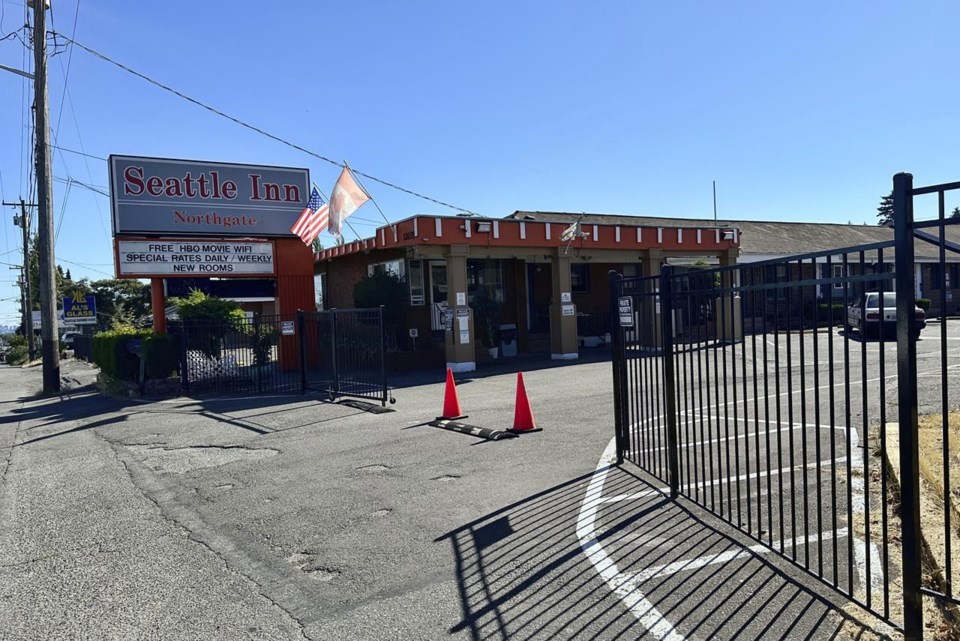SEATTLE (AP) — A vanload of church volunteers drove along a main street in north Seattle one night last month with sandwiches, water bottles and blankets for homeless people. They didn't find any — but they did see dozens of barely clothed women walking along the road or leaning into traffic to advertise their services.
“Just woman after woman after woman,” recalled one of the volunteers, Stuart Jenner. “We prayed for them as we drove south.”
About two hours later, the FBI said, a man posing as an undercover police officer shackled and abducted a woman from the area after soliciting her to engage in prostitution. He then drove her hundreds of miles to his home in southern Oregon, where he locked her in a makeshift cell in his garage — a cinder block cage with a metal door, charging papers say. She escaped by punching the door, bloodying her knuckles, until it broke.
Authorities say they are looking for more possible victims after linking the man, Negasi Zuberi, to violent sexual assaults in at least four other states. His newly appointed public defender, Devin Huseby, declined to comment Thursday.
The July 15 abduction is one of at least three cases in the past year in which police say women engaged in prostitution along Aurora Avenue had to make harrowing escapes or otherwise be rescued after being held against their will, and it raised questions about the consequences of tolerating an open sex market along the busy thoroughfare.
Last November, a 20-year-old woman who had been trafficked along Aurora tried to escape her pimp by jumping nearly naked out of the third-floor window of a home in south Seattle where she’d been kept. The escape failed, and after the pimp drove her back up to Aurora, she tried again, this time running from him and sitting topless in the roadway. A rideshare driver stopped and rescued her — and then engaged in a rolling gunfight with the pimp, who chased them in his car, police said.
The defendant in that case, Winston Burt, was arrested soon after and now faces federal sex trafficking and gun charges. He has pleaded not guilty.
Last month, a 19-year-old man and 17-year-old boy were charged with trafficking two young women out of one of the motels on Aurora, after one of the women called her father to report she was being held against her will.
“The Aurora Avenue North corridor has been a longstanding public safety challenge with human trafficking, street prostitution, drug dealing, and gun violence,” Jamie Housen, a spokesperson for Seattle Mayor Bruce Harrell, said in an email.
Seattle has been clamping down, Housen said. Police regularly make arrests in the area and issued nuisance notices last week to two budget motels on Aurora that authorities said were hotbeds of prostitution and other crime.
Aurora, an urban highway also known as State Route 99, is one of the city's main north-south arterials. Especially known for prostitution is a stretch of about 2 miles (3.2 kilometers) close to the city's northern limit that is flanked by home-improvement stores, single-story businesses, strip malls and cheap motels.
Residents have noticed a dramatic increase in the activity since the pandemic struck in 2020, as the Seattle Police Department has contended with a severe shortage of officers.
That was also the year the City Council eliminated loitering crimes as they relate to drug trafficking and prostitution. Loitering charges were rarely filed anyway, but the council cited the racist history of such laws, which were preceded by Jim Crow-era vagrancy statutes designed to target formerly enslaved people, in eliminating them.
Last week the city declared the Emerald Motel and the Seattle Inn to be chronic nuisances. The declaration requires the owners to submit a plan explaining how they will prevent their properties from being used for criminal behavior, Housen said. Failure to comply can result in fines.
Calls to those establishments seeking comment did not go through Thursday, with an automated message saying the lines were busy.
“Human trafficking takes a tragic, significant, and unacceptable toll on victims and the entire community,” Housen said. “Mayor Harrell recognizes that addressing this issue requires more than just law enforcement, including a special emphasis on victim services, support, and advocacy.”
Cory Cocktail, the co-founder of the Seattle sex worker outreach organization Green Light Project, said sex work is inherently risky, but outdoor work is especially so because of the difficulty in vetting clients. Shutting down free online sites like the Craigslist personals section and Backpage, which authorities said was used for illegal sex trafficking, helped drive some sex work onto the streets, he suggested.
The closing of the motels to prostitution could make it even more dangerous, because workers might be more likely to resort to getting into clients' cars instead. And without a consolidated community based around the motels, it would be harder for sex workers to look out for each other, Cocktail said.
“I unfortunately have been expecting something like this to happen,” Cocktail said. “I hate saying that out loud, but the circumstances being what they are, predators are empowered to hurt people right now.”
For Jenner, who volunteered through his church, University Presbyterian, for a late-night shift with the Union Gospel Mission's “Search and Rescue Program” on July 14, learning that an abduction had occurred just hours later reminded him of Gary Ridgway, the Green River serial killer, who terrorized the region in the 1980s. Ridgway picked up some of his victims, many of them sex workers, along the same stretch of Aurora.
One of Ridgway's victims, Mary Bridgett Meehan, 19, was a classmate of Jenner.
“My fervent hope is that this story can help someone to do something about all the prostitution that is on northern Aurora Avenue in Seattle,” Jenner wrote in an email to elected officials Wednesday.
___
Manuel Valdes in Seattle contributed.
Gene Johnson, The Associated Press


